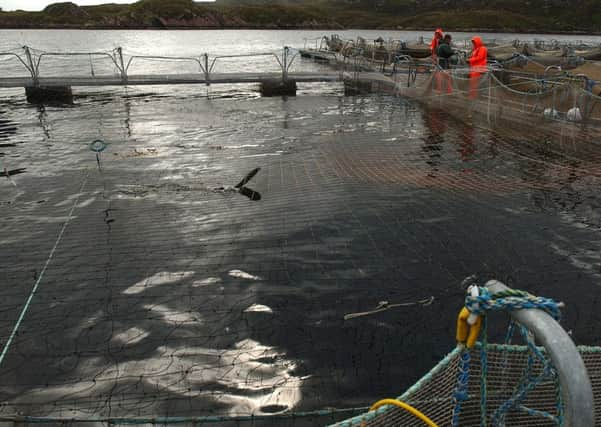Scottish salmon farm installs underwater ball games


Brightly-coloured plastic spheres and bits of tarpaulin to hide behind have been introduced to the rearing cages at Loch Duart salmon farm near Scourie in Sutherland to “relieve boredom” among the juvenile stock from biting each other.
Young salmon in hatcheries tend to bite other fish - described as “a sort of fish tag game with consequences” - and if left unchecked the damage can have a long-term impact on their health.
Advertisement
Hide AdAdvertisement
Hide AdThe firm claims the “finball” games are major breakthrough for animal welfare.
The move has also been hailed by experts at the University of Stirling -- the world’s leading institution for the study of fish-farming.
The Institute of Aquaculture at the university is to evaluate the Loch Duart experiment.
Jimmy Turnbull, professor of Aquatic Population Health and Welfare at Stirling, said: “This is obviously a very small study and you cannot extrapolate too far from it, but the fish in the tanks with enrichment apparently have better fins and this is very promising.”
A spokeswoman for Loch Duart Ltd, which employs about 100 people at sites in Sutherland and the Hebrides, said today/yesterday [WED]: “We know that most fin damage in freshwater salmon, and especially dorsal fin damage, is due to fish biting each other. Overcrowding is another cause.
“Initially the assumption was that the biting was simple aggression but, looking more closely at the behaviour, it is clear it is different to other aggressive interactions between the young fish.
“One major cause of biting is interruptions to feeding, either accidental or intentional, which make the salmon hungry and aggressive. Other factors such as low water current and higher stocking densities can also contribute.”
Loch Duart hatchery manager, David Roadknight, and his team started to look into whether boredom could be a factor.
Advertisement
Hide AdAdvertisement
Hide AdThe spokeswoman added: “The answer we came to was based on further observation.
“Tank interiors provide a very bland and uninteresting environment, even for very young fish.
“The team concluded that putting some environmental enrichment into the tanks might help to reduce boredom.”
The young salmon were given balls to play with and pieces of tarpaulin were hung in the tanks to give them a place to hide, giving protection against so-called “bully” fish -- the major biting culprits.
Loch Duart’s spokeswoman said: “All animals play and salmon are no different. This can lead to behavioural problems, with the dominant fish nipping the dorsal fins of their tank mates -- a sort of fish tag game with consequences.
“Once this behaviour starts, it is very hard to stop. The balls are points of interest and items for the salmon to play with and around, and they do, breaking the pattern of aimless circles.”
The results have been impressive, with Loch Duart reporting changes to swim patterns and an improvement in dorsal fin quality.
Managing director Alban Denton said: “David Roadknight’s innovation has the potential to improve the welfare of salmon in hatcheries significantly.”
Advertisement
Hide AdAdvertisement
Hide AdHe added: “Back in 2005, when we won the gold ‘Taste of Britain’ Award, we made a statement about our welfare policies, ‘Fish can be happy too’.
“In this dynamic young industry, we are still learning how best to achieve this.”